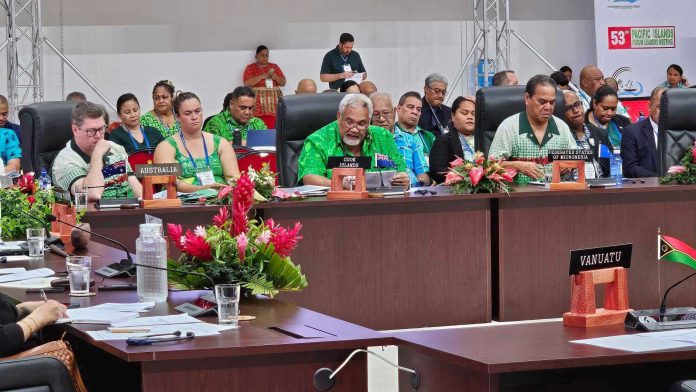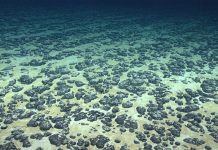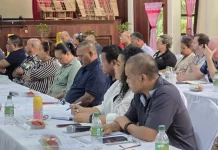Leaders of the Smaller Island States (SIS) met in Tonga last week on 27 August to discuss priorities for this group within the Pacific Islands Forum.
The group consists of the Cook Islands, the Federated States of Micronesia(FSM), Kiribati, Nauru, Niue, Palau, the Republic of the Marshall Islands (RMI), and Tuvalu.
The SIS grouping, established more than three decades ago in 1985, has long been recognized by Forum Leaders for special attention as the most vulnerable members of the family due to their unique characteristics of small size, isolation, limited transportation links, and resource constraints.
SIS Leaders acknowledged the economic, social, and environmental challenges SIS face, including the intensifying impact of climate change, food security issues due to limited agricultural potential and very small populations, connectivity challenges resulting from expensive and irregular transport links, and diseconomies of scale.
SIS Leaders invited regional organisations, development partners, and international agencies to work with SIS to support SIS priorities and challenges, including in the areas of transportation, education, health, climate finance and mobility, resource management, labor mobility, and capacity building.
The goal of SIS Leaders in Tonga was to reinvigorate the SIS grouping to ensure that it remains as relevant today as it was when first initiated in 1985 and to secure dedicated resources for SIS priorities.
In his intervention, Cook Islands Prime Minister Mark Brown noted that the “SIS constitute a sizable block of the Forum—eight out of eighteen member states—that face similar challenges as all Members, but SIS problems are compounded by disproportionately higher costs. Infrastructure costs per capita are excessive, banking services and costs are crippling, and for some, simply unavailable; and access to concessional financing for development is grossly inadequate. Dedicated resources must be allocated for SIS as even a relatively small pool of financing can go a long way to mitigating the challenges faced by our smaller Members.”
At the start of the SIS Leaders meeting, Prime Minister Brown handed over the Chairship of the SIS to the President of the Federated States of Micronesia, Wesley Simina, who presided over discussions and elevated SIS priorities to the Forum Leaders Plenary and Retreat, which convened on 29–30 August.
At the Leaders Retreat, the full Forum membership “resolved to elevate the visibility of the Smaller Island States, its priorities, challenges, and contributions at the national and regional level to better inform targeted regional solutions and called for the recognition of the Smaller Islands States grouping across the regional architecture in the Pacific, to ensure concerted efforts and steps are taken to address and respond to our vulnerabilities and challenges. Leaders also strongly urged the Pacific Regional Organisations to target assistance within their work programmes to support SIS collective and unique priorities.
Leaders further invited development partners and international agencies to also support the SIS priorities, including in the areas of transportation, education, health, climate finance and mobility, resource management, labor mobility, and capacity building.”
“We welcome Forum Leaders’ commitment to elevating the visibility of SIS priorities. We now need that commitment matched with requisite resources, and we look to the Forum Secretariat, together with our Council of Regional Organisations of the Pacific (CROP), to secure and allocate the necessary resources for the implementation of SIS initiatives aligned with the 2050 Strategy for the Blue Pacific Continent.”
The Cook Islands have long held the view that within our Forum Family, it is the SIS who stand at the frontlines of the climate emergency.
It is the SIS who continue to contend with and navigate challenges that impede their development trajectories. But more often than not, it is also the SIS that are at the forefront of innovative community-focused solutions to complex challenges and consistently punch above their weight in international advocacy the world over. What is needed is dedicated SIS resources so aspirations can move to action and development outcomes for our island communities.












